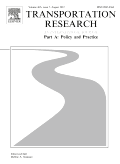
TRANSPORTATION RESEARCH PART A-POLICY AND PRACTICE
Scope & Guideline
Fostering collaboration for a sustainable transportation future.
Introduction
Aims and Scopes
- Transport Policy Analysis:
The journal extensively covers the evaluation and development of transport policies, analyzing their effectiveness, implications, and impacts on various stakeholders. - Sustainable Transportation Solutions:
It emphasizes research on sustainable transport solutions, including electric vehicles, public transit improvements, and policies aimed at reducing environmental impacts. - Behavioral Insights and Travel Demand:
Research on travel behavior, including factors influencing mode choice, commuter preferences, and the impact of socio-economic variables on travel patterns is a key focus. - Technological Innovations in Transportation:
The journal explores the role of technological advancements such as autonomous vehicles, mobility-as-a-service (MaaS), and smart transportation systems in shaping future transport landscapes. - Equity and Accessibility in Transport Systems:
Addressing social equity and accessibility issues, the journal highlights research that examines disparities in transportation access and the implications for disadvantaged groups. - Data-driven Approaches and Modeling Techniques:
The journal encourages the use of advanced modeling techniques and data-driven approaches to analyze transportation systems, incorporating big data, machine learning, and simulation methods.
Trending and Emerging
- Mobility-as-a-Service (MaaS):
Research on MaaS is gaining traction, focusing on how integrated transportation services can enhance user experience and accessibility while promoting sustainable travel behaviors. - Impact of COVID-19 on Travel Behavior:
A significant increase in studies examining how the COVID-19 pandemic has altered travel behavior, transportation demand, and public transit usage is evident, reflecting the need to adapt to changing mobility patterns. - Equity and Social Justice in Transportation:
There is a growing emphasis on equity and social justice issues within transportation research, focusing on how policies can better serve marginalized communities and reduce disparities in access. - Technological Integration and Smart Transportation Systems:
Innovative research on the integration of technologies such as autonomous vehicles, electric scooters, and smart traffic management systems is trending, highlighting the future of transportation. - Data Analytics and Big Data Applications:
The application of big data analytics in transportation studies is on the rise, with researchers leveraging vast datasets to inform planning and policy decisions. - Public Health and Transportation Interactions:
Emerging studies are increasingly addressing the intersection of public health and transportation, particularly in light of the pandemic, exploring how transport policies can promote healthier travel options.
Declining or Waning
- Traditional Transport Models:
There has been a noticeable decline in the publication of papers using traditional transport models that do not incorporate modern data analytics or behavioral insights, indicating a shift towards more dynamic and integrated modeling approaches. - Purely Economic Evaluations of Transport Projects:
While economic evaluations remain important, there is a declining emphasis on studies solely focused on cost-benefit analysis without considering broader social, environmental, and equity implications. - Static Infrastructure Planning:
Research centered on static infrastructure planning, without consideration for evolving user behaviors or technological advancements, is becoming less frequent, reflecting a need for more adaptive planning frameworks. - Single-mode Transportation Studies:
There is a waning interest in studies that focus exclusively on single modes of transport (e.g., only rail or only road), as integrated multimodal approaches are gaining more attention. - Historical Case Studies without Contemporary Relevance:
Papers focusing on historical case studies that lack direct applicability to current transportation challenges are being published less frequently, suggesting a preference for research with immediate relevance.
Similar Journals
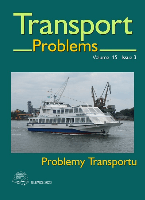
Transport Problems
Pioneering Research for Global Transport ChallengesTransport Problems, published by the Silesian University of Technology, Faculty of Transport, is a distinguished open-access journal that has been advancing scholarship in the fields of Automotive Engineering, Mechanical Engineering, and Transportation since its inception in 2007. With an ISSN of 1896-0596 and an E-ISSN of 2300-861X, this journal serves as a vital platform for researchers and practitioners to disseminate innovative research findings and explore fundamental issues in transport systems and technologies. Based in Poland, the journal covers various topics including transportation logistics, vehicle dynamics, and environmental impacts, thereby addressing critical challenges faced in the transportation sector globally. As reflected in its Scopus rankings, the journal occupies respectable quartiles and continues to contribute valuable insights to the academic community. By making its content freely accessible, Transport Problems significantly enhances the ability of researchers and students alike to engage with the latest developments in transport engineering and contribute to this ever-evolving field.
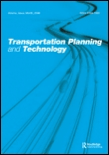
TRANSPORTATION PLANNING AND TECHNOLOGY
Transforming Transportation Through Cutting-Edge InsightsTransportation Planning and Technology is a prestigious academic journal dedicated to advancing the fields of transportation planning and technology. Published by Taylor & Francis Ltd, this journal serves as a critical platform for disseminating high-quality research and innovative practices in the context of urban and regional transportation systems. With an ISSN of 0308-1060 and an E-ISSN of 1029-0354, the journal has established a significant foothold since its inception in 1972, spanning through to 2024. Recognized in the Q2 category of Geography, Planning and Development and the Q3 category of Transportation in the 2023 rankings, it reflects a solid impact factor supported by its Scopus classifications, holding a rank of #270/821 in Geography, Planning and Development and #72/141 in Transportation. Researchers, professionals, and students alike benefit from the journal's comprehensive scope, which encompasses theoretical aspects, practical applications, and policy implications related to transportation systems. As an essential resource in the field, it invites contributions that enhance our understanding of the complexities in transportation planning, making it a must-read for those engaged in related studies.
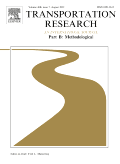
TRANSPORTATION RESEARCH PART B-METHODOLOGICAL
Advancing the frontier of transportation research methodologies.TRANSPORTATION RESEARCH PART B - METHODOLOGICAL is a premier academic journal published by Pergamon-Elsevier Science Ltd, focusing on innovative methodologies and solutions in the field of transportation research. With a prestigious Q1 ranking in key categories, including Civil and Structural Engineering, Management Science and Operations Research, and Transportation, the journal demonstrates its vital role in advancing the academic discourse and practical applications within these domains. Boasting an impressive Scopus ranking of #20 in Civil and Structural Engineering and #15 in Transportation, it attracts high-quality research that informs policy, enhances transport systems, and contributes to sustainable development. The journal serves as a critical platform for researchers, practitioners, and students alike to disseminate findings that push the boundaries of transportation science. With a publication history dating from 1979 to 2024, TRANSPORTATION RESEARCH PART B is dedicated to fostering interdisciplinary collaborations and inspiring new methodologies to tackle complex transportation challenges. As a vital resource for the academic community, it leverages a broad international perspective to enrich the field and facilitate cutting-edge research.
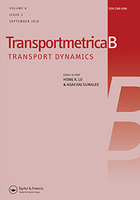
Transportmetrica B-Transport Dynamics
Connecting Ideas in Transport DynamicsTransportmetrica B: Transport Dynamics is a premier academic journal published by Taylor & Francis Ltd, focusing on innovative research in the fields of transportation dynamics, modeling, and simulation. Established in 2013 and running through 2024, this journal holds a prestigious Q1 ranking in Modeling and Simulation, Software, and Transportation categories, reflecting its commitment to high-quality scholarship. With an impactful presence, evidenced by its Scopus rankings—73rd in Mathematics, 57th in Social Sciences, and 174th in Computer Science—Transportmetrica B serves as a critical platform for researchers, professionals, and students seeking to explore and disseminate groundbreaking findings in transport dynamics. The journal is accessible via open access options, ensuring that its valuable insights reach a global audience. As the field of transport continues to evolve, Transportmetrica B remains at the forefront, championing extensive research and development that address the challenges of modern transportation systems.
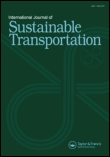
International Journal of Sustainable Transportation
Navigating Towards Cleaner, Greener TransportationInternational Journal of Sustainable Transportation, published by Taylor & Francis Inc, stands at the forefront of research in sustainable mobility, addressing critical challenges within the fields of engineering, environmental science, and urban planning. With ISSN 1556-8318 and E-ISSN 1556-8334, this journal is recognized for its exceptional quality, evidenced by its Q1 rankings across multiple categories including Automotive Engineering, Civil and Structural Engineering, Environmental Engineering, and Transportation, as well as a notable presence in Renewable Energy and Sustainability. Its impact is further amplified by impressive Scopus rankings, securing top positions in various fields, ensuring that it serves as a pivotal resource for researchers, practitioners, and policymakers dedicated to advancing sustainable transportation solutions. The journal actively disseminates cutting-edge research that informs sustainable practices worldwide, thus contributing to the development of greener transportation methods. As it continues its mission from 2007 to 2024, International Journal of Sustainable Transportation remains essential for anyone looking to explore innovative approaches to the transportation challenges of our time.

European Journal of Transport and Infrastructure Research
Connecting ideas, shaping policies, transforming transport.The European Journal of Transport and Infrastructure Research (EJTIR) is a premier academic journal dedicated to advancing the field of transport and infrastructure studies. Established in 2000 and published by the EDITORIAL BOARD EJTIR in the Netherlands, this open-access journal promotes the dissemination of high-quality research through a global platform. With an impressive categorization in the Q2 quartile for Geography, Planning, and Development, as well as Urban Studies, and a Q3 ranking in Transportation as of 2023, EJTIR is recognized for its significant contributions to these vital disciplines. It holds commendable Scopus rankings, reflecting its impact and relevance in the social sciences. The journal's objectives include fostering innovative research, facilitating a dialogue among scholars, practitioners, and policymakers, and addressing contemporary transportation challenges. The open access model ensures that research findings are accessible to a wider audience, thereby promoting evidence-based decision-making in transport policies and infrastructure development. Researchers, professionals, and students are encouraged to engage with the journal's content, contributing to the ongoing discourse in this essential field.

Journal of Transport and Land Use
Advancing Knowledge in Transportation and Land UseJournal of Transport and Land Use, published by the University of Minnesota's Center for Transportation Studies, is a prominent open-access journal that has been disseminating high-quality research since its inception in 2008. Focused on the intersections of transportation, urban studies, and land use planning, this journal plays a critical role in addressing contemporary challenges in mobility and spatial development. With an impressive categorization in 2023 as Q2 in Geography, Planning and Development and Transportation, and Q1 in Urban Studies, it stands out with its Scopus rankings that position it within the top quartiles of significant disciplines, reflecting its impact and relevance. Catering to researchers, professionals, and students alike, the Journal of Transport and Land Use seeks to foster interdisciplinary dialogue and collaboration through its comprehensive exploration of the complex relationships between transportation systems and land use policies. With its ongoing commitment to facilitating knowledge dissemination and open access, this journal serves as a vital resource for advancing scholarly discourse in the field.
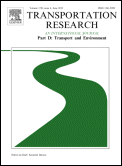
TRANSPORTATION RESEARCH PART D-TRANSPORT AND ENVIRONMENT
Connecting transportation systems with environmental stewardship.Transportation Research Part D: Transport and Environment is a premier academic journal published by Pergamon-Elsevier Science Ltd, dedicated to advancing knowledge in the fields of civil and structural engineering, environmental science, and transportation. With an impressive Impact Factor and ranked in the Q1 category for 2023 across multiple disciplines, this journal serves as a critical resource for researchers, professionals, and students interested in the intersections of transportation systems and environmental challenges. Spanning the years from 1996 to 2024, the journal features innovative studies that address pressing transportation and environmental issues, fostering interdisciplinary collaboration and insights. Although not an open-access journal, articles published in Transportation Research Part D are accessible through institutional databases, making significant contributions to academia and practice in the UK and globally. Scholars looking to stay at the forefront of research related to sustainable transport solutions and their implications for the environment will find this journal indispensable.
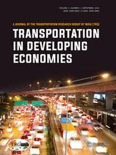
Transportation in Developing Economies
Empowering policymakers with critical insights on mobility.Transportation in Developing Economies is a premier academic journal published by SPRINGER INT PUBL AG, specializing in the interdisciplinary study of transportation systems in developing nations. With an ISSN of 2199-9287 and an E-ISSN of 2199-9295, this journal provides an essential platform for researchers, policymakers, and practitioners to explore the unique challenges and innovations in transportation infrastructure, mobility, and planning within emerging economies. The journal aims to critically assess and promote sustainable transport solutions that cater to the socio-economic dynamics of these regions, making it an invaluable resource for those invested in equitable transportation development. With its open access philosophy, it ensures widespread dissemination of research findings, fostering collaboration and knowledge exchange among scholars and industry professionals alike. As the global focus on sustainable practices intensifies, Transportation in Developing Economies stands at the forefront of vital research, contributing to both academic discourse and pragmatic advancements in the field.

International Journal of Transport Economics
Shaping the Future of Transportation Through Economic InsightWelcome to the International Journal of Transport Economics, a premier platform published by FABRIZIO SERRA EDITORE that explores the intricate relationship between transport economics and its impact on societal progress. Established to foster academic discourse, this journal serves as a vital resource for researchers, professionals, and students in the fields of economics, transportation, and public policy. With a commitment to publishing high-quality, peer-reviewed articles, the journal delves into essential topics such as transport policy analysis, infrastructure economics, and sustainable transportation solutions. Although it operates under a traditional subscription model, the journal remains dedicated to disseminating crucial findings that influence transport strategies worldwide. Nestled in the heart of Pisa, Italy, the International Journal of Transport Economics stands as a beacon of knowledge, playing a pivotal role in shaping the future of transport economics and promoting innovative research in the discipline.